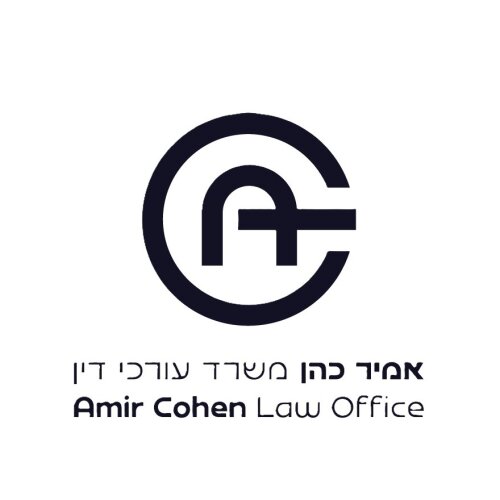Best Divorce & Separation Lawyers in Tel Aviv
Share your needs with us, get contacted by law firms.
Free. Takes 2 min.
Free Guide to Hiring a Family Lawyer
List of the best lawyers in Tel Aviv, Israel
About Divorce & Separation Law in Tel Aviv, Israel
Divorce and separation laws in Tel Aviv, Israel are governed by a combination of civil and religious laws. Married couples seeking to divorce must navigate through Rabbinical Courts for those of the Jewish faith, while other religious individuals are subject to the relevant religious or civil courts. This dual system can often be complex, making it essential for individuals to understand the basics and seek professional legal assistance where necessary.
Why You May Need a Lawyer
Engaging a lawyer for divorce and separation issues is often crucial for several reasons:
- Complex Legal Processes: Navigating the intertwined civil and religious legal systems can be daunting without professional help.
- Fair Distribution of Assets: Ensuring that property, finances, and other assets are divided equitably.
- Child Custody Matters: Determining custody, visitation rights, and child support can be contentious and requires precise legal guidance.
- Spousal Support: Need for clear agreements on any spousal support or alimony.
- Emotional Support: Having a lawyer can help reduce the emotional burden by providing objective and rational advice.
Local Laws Overview
Divorce and separation in Tel Aviv are heavily influenced by both Jewish religious law (Halakha) and Israeli civil law. Below are key aspects you should be aware of:
- Rabbinical Courts: Jewish marriages and divorces must be processed through these courts to be recognized by the state.
- Get (Divorce Document): For a Jewish divorce to be complete, a 'Get' must be issued by the Rabbinical Court.
- Civil Aspects: Child custody, asset division, and spousal support may also be handled in Family Courts, which deal with civil aspects of divorce.
- Mutual Consent: Both parties must agree to the divorce; otherwise, legal proceedings may become prolonged and complex.
- International Implications: For mixed-nationality couples, international legal implications might also play a role, making legal counsel indispensable.
Frequently Asked Questions
What is the first step in filing for a divorce in Tel Aviv?
The first step is to file a petition for divorce in either the Rabbinical Court or the Family Court, depending on your circumstances.
How long does the divorce process usually take?
The duration varies depending on the complexity of the case, agreement between parties, and court schedules; it can take anywhere from a few months to several years.
Do both parties need to consent to the divorce?
Yes, mutual consent is generally required; otherwise, the process can be significantly prolonged and may require litigation.
How is child custody determined?
Child custody is determined based on the best interests of the child, taking into account factors like parental stability, living conditions, and child's preferences.
What are the grounds for divorce in Israel?
Grounds for divorce can include adultery, abuse, abandonment, and irreconcilable differences, among others.
What happens if one spouse refuses to grant a ‘Get’?
If one spouse refuses to grant a 'Get', the Rabbinical Court can impose sanctions or penalties to encourage compliance.
Is spousal support mandatory?
Spousal support is determined by the courts and is based on various factors such as financial need, length of marriage, and earning capacity of both spouses.
Are prenuptial agreements recognized in Tel Aviv?
Yes, prenuptial agreements are recognized and can be legally enforced, provided they meet specific legal criteria.
How are assets divided during a divorce?
Assets are divided based on the principles of equitable distribution, which may not necessarily mean a 50-50 split but what is deemed fair by the court.
Can I get divorced in Israel if I was married abroad?
Yes, you can get divorced in Israel even if the marriage took place abroad, but you'll need to provide proof of marriage and fulfill certain legal requirements.
Additional Resources
If you need more information or assistance, consider these resources:
- Ministry of Justice - Family Court and Legal Aid services
- The Rabbinical Court Administration
- Na’amat - Women's rights and advocacy organization
- WIZO - Women's International Zionist Organization for family support
Next Steps
If you need legal assistance in Divorce & Separation, follow these steps:
- Consult a Lawyer: Seek a consultation with a lawyer specializing in divorce and family law in Tel Aviv.
- Document Preparation: Gather all necessary documents such as marriage certificates, financial statements, and any prenuptial agreements.
- File a Petition: Work with your lawyer to file the divorce petition in the appropriate court (Rabbinical or Family Court).
- Attend Hearings: Show up to all scheduled court hearings and follow your lawyer's advice throughout the process.
- Mediation: Consider mediation services to reach amicable settlements on contentious issues like child custody and asset division.
Taking these steps can help ensure that you navigate the complexities of divorce and separation law in Tel Aviv with greater ease and assurance.
Lawzana helps you find the best lawyers and law firms in Tel Aviv through a curated and pre-screened list of qualified legal professionals. Our platform offers rankings and detailed profiles of attorneys and law firms, allowing you to compare based on practice areas, including Divorce & Separation, experience, and client feedback.
Each profile includes a description of the firm's areas of practice, client reviews, team members and partners, year of establishment, spoken languages, office locations, contact information, social media presence, and any published articles or resources. Most firms on our platform speak English and are experienced in both local and international legal matters.
Get a quote from top-rated law firms in Tel Aviv, Israel — quickly, securely, and without unnecessary hassle.
Disclaimer:
The information provided on this page is for general informational purposes only and does not constitute legal advice. While we strive to ensure the accuracy and relevance of the content, legal information may change over time, and interpretations of the law can vary. You should always consult with a qualified legal professional for advice specific to your situation.
We disclaim all liability for actions taken or not taken based on the content of this page. If you believe any information is incorrect or outdated, please contact us, and we will review and update it where appropriate.

















